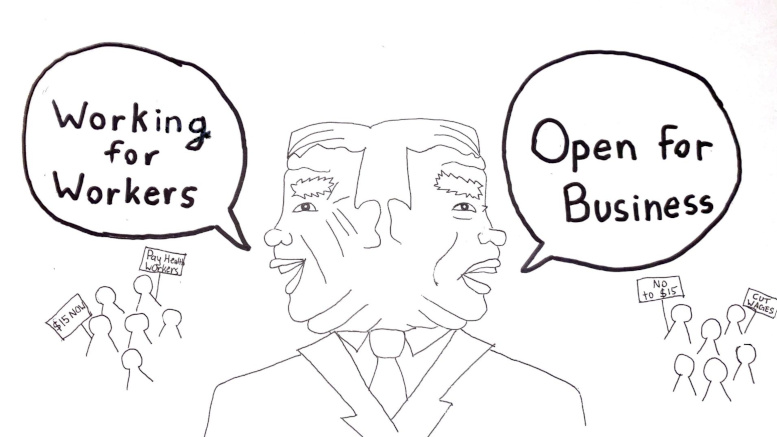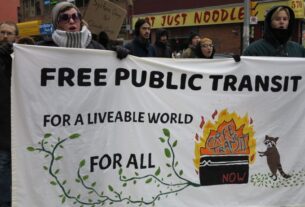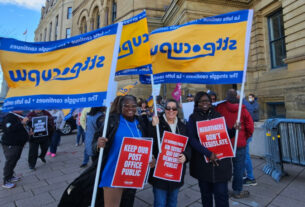Ontario goes to the polls on June 2. Doug Ford must go. Yet, this seems unlikely with the polls giving him a clear lead. How, after four years of U-turns, cutting services, gaffes and COVID shambles, is this possible?
Somehow, Ford has led a charmed life over these years. He started off with policies to boost profits, saying Ontario was “Open for business.” With this aim, he scrapped the scheduled minimum wage increase, calling it a “a job killer,” and eliminated two paid sick days. He went on to cut health care and attack teachers. Not surprisingly he was booed at Toronto’s championship reception for the Raptors in 2019. In 2021 he limited public sector pay increases to one percent over three years, while inflation soared.
His pandemic performance was, at best, erratic. Before the 2020 March school break, he told families to “have fun” and “go away.” He then presided over the desperate situation in long-term care homes with far worse death rates in private for-profit homes, some needing the army to go in to clear up the mess. He is good at populist one-liners, such as promising to “come after” COVID profiteering, although much weaker on delivery. His folksy, “common man” style helped to mitigate his many stumbles.
Two-Faced Ford
As the election approached, Ford developed a new slogan using the same name as his
Working for Workers Act, 2021. Under public pressure, he had already increased (belatedly) the minimum wage to $15 and re-established paid sick days, although the three days are “paid infectious disease emergency leave” and are only temporary until the end of 2022. With an election coming, Ford decided to portray himself as the friend of workers. One of the legislative measures introduced in the last year was called “Disconnecting from Work.” This requires employers with 25 or more employees to have a written policy about employees disconnecting from their job (by phone, email, etc.) at the end of each workday. Another was about washroom availability for delivery workers, a policy requiring business owners to allow outside workers to use a company’s washroom if they are delivering or picking up items. While these measures are welcome in themselves, it remains to be seen how strictly they are enforced.
Ford’s play acting evidently made an impression on some union leaders. Scandalously, Jerry Dias (former head of Unifor) and Smokey Thomas (Ontario public service union) bolstered Ford’s new image as the workers’ friend by sharing his platform at the announcement of the minimum wage increase.
Environment
The pre-election budget included major infrastructure, a few crumbs for low paid workers and nothing good for the environment. Ford’s slogan is “build, build, build” with the emphasis on the construction of new highways. On the other hand, more than 700 renewable energy projects, mostly sponsored by municipalities and Indigenous communities, were arbitrarily cancelled.
Under Ford, the big winners so far have been clear: developers; the mining and aggregate industries; and nuclear and natural gas-based incumbents in the energy sector. Mark Winfield, Professor of Environmental Studies at York University, argues that the province’s new interest in and funding for “greening the steel sector and electric vehicle manufacturing suggests an awakening. But these developments don’t flow from a concern for the environment. Rather they reflect a recognition, at some level, that global economic shifts in the direction of decarbonization are taking place and that Ontario risks losing what remains of its manufacturing sector if it doesn’t respond.”
NDP’s lacklustre performance.
As well as good luck and friendly union leaders, Ford has been helped by the NDP’s lacklustre performance. In the 2018 election, the Liberals finished a poor third place behind the NDP with only 7 seats. The NDP’s consistent failure to campaign between elections gave the Liberals space to recover. So far in the campaign, opinion polls have the NDP behind the Liberals, even though the Liberals have a virtually unknown leader, Steven Del Duca. This split in the anti-Ford vote would give Ford another four years to go back to attacking workers, public services and the environment.
Andrea Horwath, Ontario NDP leader, said the federal arrangement between Liberals and NDP, announced in March, proves that “when you elect New Democrats, you can get things done.” Perhaps it’s early days but we have yet to see what gets done in that area. A senior NDP official commented at the time, “If this [the agreement] helps Andrea and sidelines Del Duca that should be good for us.” Well, that hasn’t happened. If anything, it is Horvath who has been sidelined with Del Duca becoming the second-place challenger to Ford.
Election campaigns matter
It is not too late — election campaigns do matter. In six weeks in the 2015 election, Trudeau took the Liberals from third place to winning with the promise of bold change. The NDP is leading among young people. If the youth are inspired by a bold platform and dynamic campaigning, they can reach every part of the province and win the support of older workers, as Jeremy Corbyn’s, Bernie Sanders’ and Jean-Luc Mélenchon’s campaigns showed. Not taking this approach leads to a focusing of energy on just parliamentary methods and party pacts, and further defeats. Taking it provides the best path both to victory and to begin building socialist policies in Ontario.




